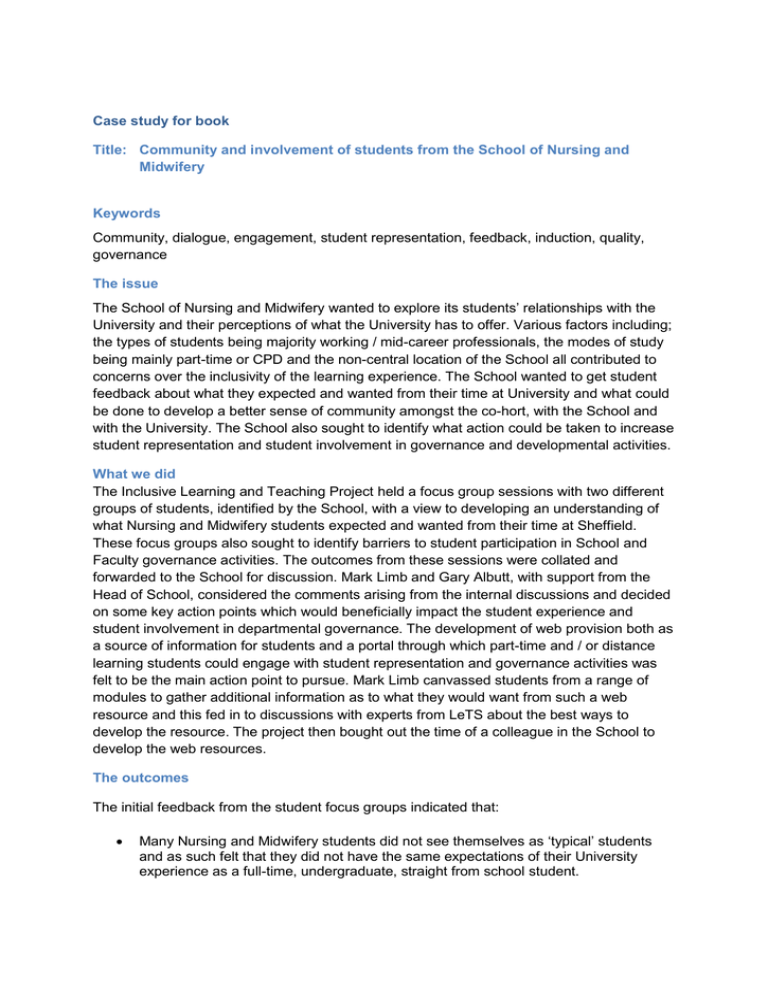Case study for book Midwifery
advertisement

Case study for book Title: Community and involvement of students from the School of Nursing and Midwifery Keywords Community, dialogue, engagement, student representation, feedback, induction, quality, governance The issue The School of Nursing and Midwifery wanted to explore its students’ relationships with the University and their perceptions of what the University has to offer. Various factors including; the types of students being majority working / mid-career professionals, the modes of study being mainly part-time or CPD and the non-central location of the School all contributed to concerns over the inclusivity of the learning experience. The School wanted to get student feedback about what they expected and wanted from their time at University and what could be done to develop a better sense of community amongst the co-hort, with the School and with the University. The School also sought to identify what action could be taken to increase student representation and student involvement in governance and developmental activities. What we did The Inclusive Learning and Teaching Project held a focus group sessions with two different groups of students, identified by the School, with a view to developing an understanding of what Nursing and Midwifery students expected and wanted from their time at Sheffield. These focus groups also sought to identify barriers to student participation in School and Faculty governance activities. The outcomes from these sessions were collated and forwarded to the School for discussion. Mark Limb and Gary Albutt, with support from the Head of School, considered the comments arising from the internal discussions and decided on some key action points which would beneficially impact the student experience and student involvement in departmental governance. The development of web provision both as a source of information for students and a portal through which part-time and / or distance learning students could engage with student representation and governance activities was felt to be the main action point to pursue. Mark Limb canvassed students from a range of modules to gather additional information as to what they would want from such a web resource and this fed in to discussions with experts from LeTS about the best ways to develop the resource. The project then bought out the time of a colleague in the School to develop the web resources. The outcomes The initial feedback from the student focus groups indicated that: Many Nursing and Midwifery students did not see themselves as ‘typical’ students and as such felt that they did not have the same expectations of their University experience as a full-time, undergraduate, straight from school student. Students did feel remote from the rest of the University and somewhat like poor relations which was exacerbated by the fact that University facilities and information appeared to be designed for full-time, main campus students. Information provided to students prior to starting and at induction could be improved (e.g. amount of time that would be required for study, timetables, study skills and key contacts) A web resource with clear links to academic and support information and contacts would be welcomed. This would benefit from having information on work/life/study balance. There was mixed awareness of departmental and University governance structures Many students were interested in being able to participate in discussions and activities as part of departmental governance and felt that an online facility through which to do this would be most convenient Most students felt they would be motivated to get more involved if they could see that the feedback was having an impact and making a difference The Project has: Enabled the School to set up a web resource with links to key information and contacts Enabled the School to set up a group on USpace for part-time students in which there will be agendas and minutes from key committees in the School and discussion threads and feedback on topics important to the students. This project has successfully targeted a couple of small but key points that can help students feel supported and involved. It is sustainable, and can be developed and enhanced in the future. Learning Points That different types of students need different support Assumptions should not be made about what students deem as important or see as issues. Students welcome being consulted about their education and being actively involved in shaping their learning experiences The University still has work to do in communicating to students how it operates and how they can be involved Links and further references The Learning and Teaching Project website has provided inclusive hints and tips for staff, inspired by student feedback: http://www.shef.ac.uk/lets/projects/inclusivel&t/hintsandtips.html The IL&T Project has reviewed existing materials and created a web page signposting resources available on learning styles: http://www.shef.ac.uk/lets/projects/inclusivel&t/learningstyles.html

